

Regeneration may cause isolation for older people, study finds. A study by an academic from The University of Manchester has found that urban regeneration in poor neighbourhoods can actually backfire, and lead to older people feeling isolated.
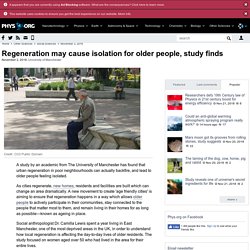
As cities regenerate, new homes, residents and facilities are built which can change an area dramatically. A new movement to create 'age friendly cities' is aiming to ensure that regeneration happens in a way which allows older people to actively participate in their communities, stay connected to the people that matter most to them, and remain living in their homes for as long as possible—known as ageing in place. Social anthropologist Dr. Camilla Lewis spent a year living in East Manchester, one of the most deprived areas in the UK, in order to understand how local regeneration is affecting the day-to-day lives of older residents. The study focused on women aged over 50 who had lived in the area for their entire lives. Explore further: Affecting the well-being of elderly urban residents. Study: Climate change could force outdoor workers to wake up far earlier. A new study published in Earth's Future, a journal of the American Geophysical Union, indicates that if society tries to avoid the economic impacts of climate change on outdoor labor by shifting working hours, outdoor workers in many regions will need to start working well before dawn at the end of this century to avoid the effect of excessive heat stress.
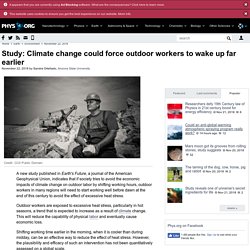
Outdoor workers are exposed to excessive heat stress, particularly in hot seasons, a trend that is expected to increase as a result of climate change. This will reduce the capability of physical labor and eventually cause economic loss. Buzz of drones is more annoying than any other kind of vehicle. What's the Buzz? The Drones Are Here. Ooho! - water in edible bubble.
Germany pushes for tax hike on meat and cheese. Wealthier people do less in the struggle against climate change – URV Activ@ A collective-risk dilemma experiment with members of the public in Barcelona has shown that people are more or less likely to contribute money to fighting climate change depending on their how wealthy they are.
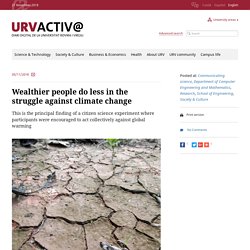
The Power to Upgrade Our Own Biology Is in Sight—But Is Society Ready for Human Enhancement? Upgrading our biology may sound like science fiction, but attempts to improve humanity actually date back thousands of years.

Every day, we enhance ourselves through seemingly mundane activities such as exercising, meditating, or consuming performance-enhancing drugs, such as caffeine or adderall. However, the tools with which we upgrade our biology are improving at an accelerating rate and becoming increasingly invasive. In recent decades, we have developed a wide array of powerful methods, such as genetic engineering and brain-machine interfaces, that are redefining our humanity.
In the short run, such enhancement technologies have medical applications and may be used to treat many diseases and disabilities. Additionally, in the coming decades, they could allow us to boost our physical abilities or even digitize human consciousness. The impact of precision technology on the future of the environment and crop protection. Currently, agricultural techniques that are economical, productively, and socially, environmentally sustainable are on real demand.
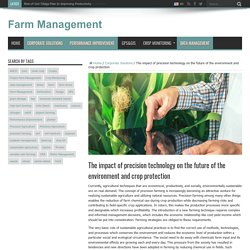
The concept of precision farming is increasingly becoming an attractive venture for realizing sustainable agriculture and utilizing natural resources. Precision farming among many other things enables the reduction of farm chemical use during crop production while decreasing farming risks and contributing to field-specific crop applications. In return, this makes the production processes more specific and designable which increases profitability. The introduction of a new farming technique requires complex and informed management decisions, which includes the economic relationship like cost-yield income which should be put into consideration.
Farming strategies are obliged to these requirements. Privatisation of public space. The rise of the quasi-public space and its consequences for cities and culture. A new phenomenon is emerging in London: quasi-public spaces.
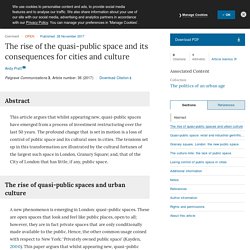
These are open spaces that look and feel like public places, open to all; however, they are in fact private spaces that are only conditionally made available to the public. Hence, the other common usage coined with respect to New York: ‘Privately owned public space’ (Kayden, 2000). This paper argues that whilst appearing new, quasi-public spaces have emerged from a process of investment restructuring over the last 50 years.
Sixlegsfarm.co.
Interesting one but I can't seem to see the content of the article – k.garnettcranfield.ac.uk
Chips Made with Cricket Flour - As Seen on Shark Tank. Using environmental imperatives to reduce meat consumption: perspectives from New Zealand: Kōtuitui: New Zealand Journal of Social Sciences Online: Vol 13, No 1. Unless Governments Get Involved, Plant-Based Meat Won’t Take Off. Food Fight. Humans have always depended on the sea.
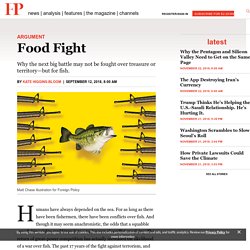
For as long as there have been fishermen, there have been conflicts over fish. And though it may seem anachronistic, the odds that a squabble over fishing rights could turn into a major armed conflict are rising. The return of great-power competition has actually increased the likelihood of a war over fish. The past 17 years of the fight against terrorism, and Washington’s renewed focus on developing high-end capabilities to prepare for great-power conflict, have led to a lack of preparation for a low-end, seemingly mundane but increasingly likely source of conflict in the world: food.
As incomes rise around the world, so too does the demand for food—especially protein. Bitcoin emissions alone could push global warming above 2°C. Could the heat generated by blockchain be useful for other living beings? 3D printing coral reefs can create new habitat – but it doesn't tackle human destruction. Coral reefs are vanishing from the world’s oceans.
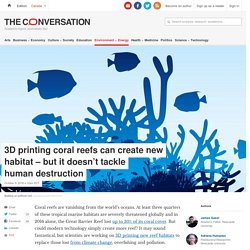
At least three quarters of these tropical marine habitats are severely threatened globally and in 2016 alone, the Great Barrier Reef lost up to 30% of its coral cover. But could modern technology simply create more reef? It may sound fantastical, but scientists are working on 3D printing new reef habitats to replace those lost from climate change, overfishing and pollution. Coral reefs are important ecosystems for people in tropical countries as the sea life which lives on them is a major source of food and income. Viral bear video shows how drones threaten wildlife – and what to do about it. A recent online video took what seemed like an inspirational moment viral.
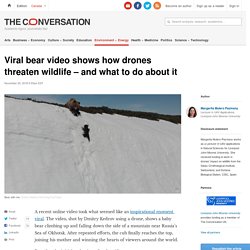
The video, shot by Dmitry Kedrov using a drone, shows a baby bear climbing up and falling down the side of a mountain near Russia’s Sea of Okhotsk. After repeated efforts, the cub finally reaches the top, joining his mother and winning the hearts of viewers around the world. But after the initial enthusiasm for the video came some controversy when scientists pointed out that the incident may have been caused by the drone risking the cub’s life by interrupting its efforts to climb to safety. This prompted some online commenters to call for drones to be banned on grounds of environmental impact, while others defended the responsible use of this technology.
How Private Lawsuits Could Save the Climate. Can a bunch of crab fishermen save the earth?
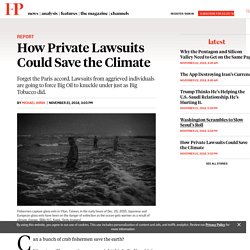
It’s not as silly a question as you might think. On Nov. 14, in an unprecedented action by private individuals in a U.S. court, commercial fishermen in California and Oregon sued 30 oil, gas and coal companies, seeking compensation for their losses because the Dungeness crab market in the Pacific Ocean has been harmed by rising temperatures caused by burning fossil fuels. Some legal experts say the little-noticed lawsuit filed in Superior Court in San Francisco was a legal earthquake. How will autonomous robots change our cities? Citizens prefer landscapes that combine nature with built infrastructure. Citizens prefer to enjoy natural landscapes that combine nature with built infrastructure, and that are close and accessible.
This is apparent from the results of a pioneering study developed by researchers from the Institute of Science and Environmental Technology of the Universitat Autònoma de Barcelona (ICTA-UAB) in which, for the first time, the preferences of the citizens of Barcelona have been analysed with regard to landscape aesthetics on the basis of photographs shared on social media. Land-use policies and landscape planning developed by public institutions are increasingly taking into account ecosystem services—that is, the benefits that nature brings to society and that improve health, economy and people's quality of life. Floating farm could grow food on empty cargo ships. Number of empty homes hits highest rate for 20 years calling into question need to build on countryside. Scandal of Europe's 11m empty homes. More than 11m homes lie empty across Europe – enough to house all of the continent's homeless twice over – according to figures collated by the Guardian from across the EU.
Is food the next big thing in fashion? Agraloop Technology — Circular Systems. Europe Has Criminalized Humanitarianism. Over the course of June and July, through a patchwork of frantic stopgap measures and pledges, European leaders fortified Europe’s borders along its southern perimeter in another push to restrict migration to the continent. Robots in sewers will save society millions. A Purple, Photosynthetic Bacteria Can Turn Your Poop Into Power. Biochar from organic waste. World-first: Bio-bricks from urine. International Coffee Day: Imagine cities powered by coffee waste. A Cruise Line Plans to Power Its Ships with Dead Fish. Go Fish We hear a lot about vehicles powered by fossil fuels and electricity. Universal income - answer to automation? How to keep humans from ruining the search for life on Mars. How farming can profit from healthier diet trend - Farmers Weekly. The recent Health and Harmony consultation from Defra, while covering a wide range of policy options for post-Brexit agriculture, has been criticised by some for its lack of focus on human health and nutrition.
But a new report from Exeter University’s Prof Michael Winter, designed to coincide with the inaugural Nuffield Farming Lecture in early July, suggests there are considerable opportunities for farmers to tap into the growing demand for healthy food – with or without government support. In smart cities, advertisers will rule.
How is rising air pollution affecting our brains? Five reasons to forget Mars for now and return to the moon. Environmental risks: industrial infrastructures and cybersecurity. Cohousing is an inclusive approach to smart, sustainable cities. We need to support models of living that can both improve our actual well-being and reduce material demands on the planet. Existing models of urban development that can achieve these goals are taking hold across North America. Future technology ‘cannot rescue’ mankind from climate change, say experts. Future - One simple reason we aren’t acting faster on climate change?
Greenwashing: corporate tree planting generates goodwill but may sometimes harm the planet. Comparing apples to apples: an environmental criminology analysis of the effects of heat and rain on violent crimes in Boston. Why we need new architectural and design paradigms to meet the needs of vulnerable people. Future cities: moving from technical to human needs. Privacy Advocates Are Criticizing Google Sidewalk Labs. Social norms and farm animal protection. Here’s why it matters which government agency regulates fake meat. Dietary changes needed to improve diet sustainability: are they similar across Europe? How Conservation Became Colonialism. Invasion? Takeover? Opportunity? What the robots mean for jobs. Why women are twice as likely as men to lose their job to robots.
Social aspects of automation: Some critical insights. Nature’s Make or Break Potential for Climate Change. Energy, Economics, and the Environment by Giulio Boccaletti. Chef Timothy Roberts is Creating a Personalized Dining Experience - Data Makes Possible. Trust is Down, Expectations are Up as Brands Take Center Stage in Cultural Divides.